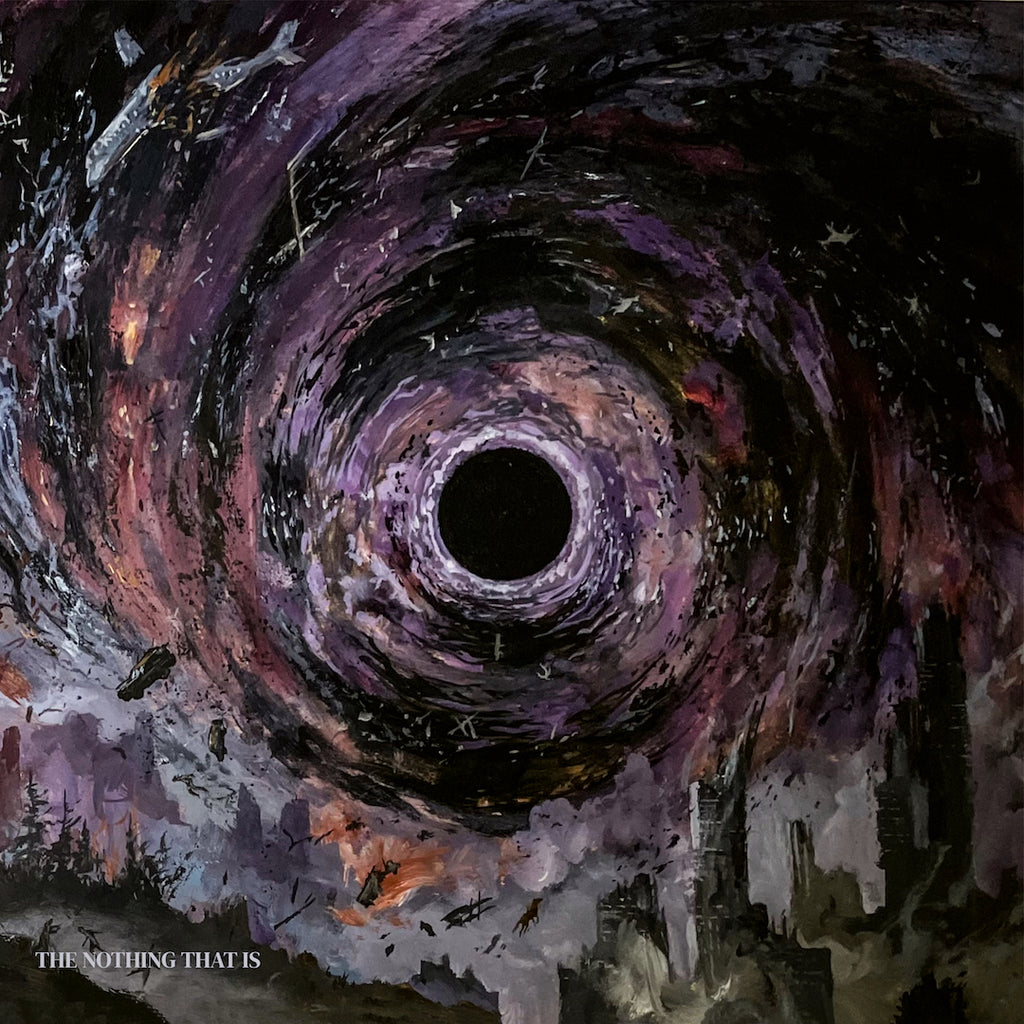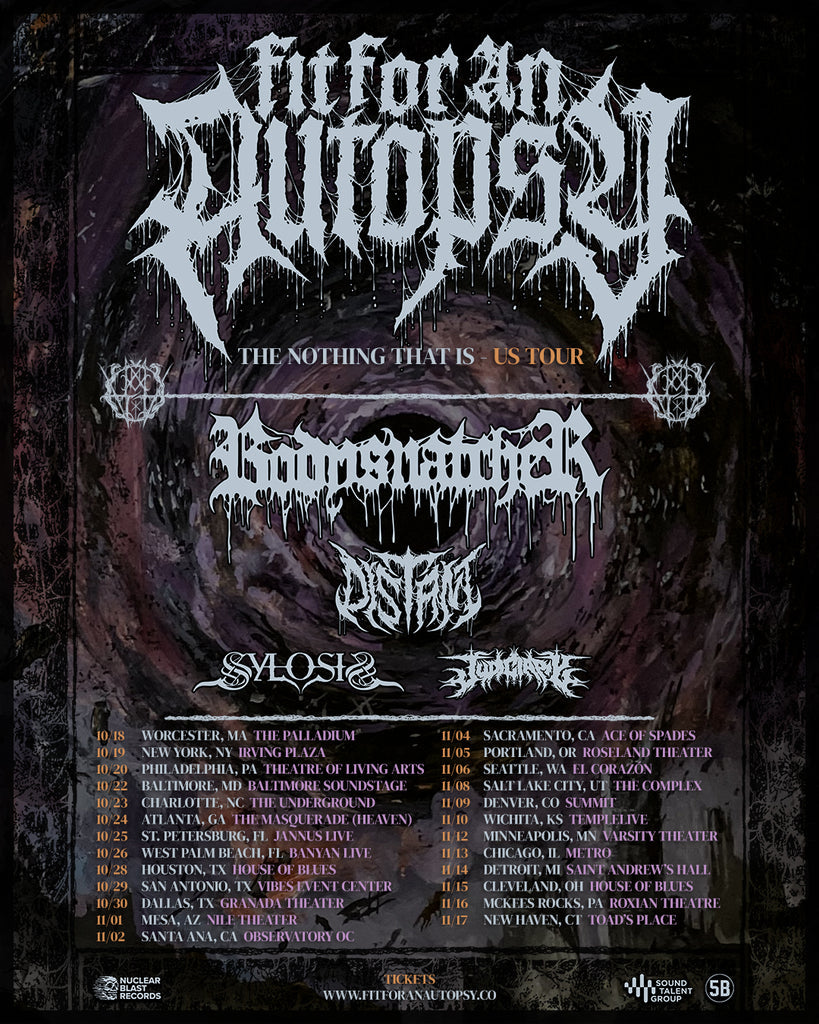Words by Maddy Howell / Photo by Cameron Nunez
Over fifteen years into their career, Fit For An Autopsy are no strangers to exploring the harshest corners of the human experience.
Their visceral sound and raw social commentary leading the New Jersey outfit to become a cornerstone of heavy music over the last fifteen years, since their 2011 debut full-length - The Process of Human Extermination – they’ve been plunging deeper and deeper into the chaos and despair of the world around us, refusing to shy away from confronting its often-bleak realities.
A snapshot of a planet teetering on the edge, the band’s seventh studio album arrives at a moment in which the darkness feels more palpable than ever. Their most brutal and introspective work to date, The Nothing That Is is a timely meditation on a world struggling with division, environmental decay, and societal failures, reflecting the disillusionment of the present and the uncertainty of the future. Channelling their fury and frustration into ten tracks that offer zero comforting resolutions, each riff is loaded with equal parts existential despair and sheer catharsis, and every melody pushes the boundaries of what modern deathcore can be.
Exploring the relentless pursuit of meaning in a fractured existence, we sat down with guitarist and producer Will Putney to dive into the making of The Nothing That Is, the evolution of the band's creative vision, and why, for Fit For An Autopsy - hope will always come secondary to truth.
It’s been a couple of years since Oh What The Future Holds dropped. Coming out of that album cycle, knowing the forward strides you took and the success that came from them, how were you feeling as that era rounded out?
Putney - Honestly, it was great for the band, especially coming out of COVID. When touring stopped, it was a point of stress for every band, and we had been on a path to something. We had a big plan, and all of a sudden, an entire year was completely wiped out. We were all feeling down, and it was definitely a tense time, but we decided that the second we could go out again - we'd have a record ready.
We wanted to be out of the gate fast, and I think we were one of the first bands from our world to get back to Europe. We were one of the first bands that played a full US run after the pandemic, and that’s because we wanted to get ahead of it. To a certain extent, I’m sure that helped us. We we were so ready to go when the world opened back up, and after that the band just didn't stop for two years.
We hit it really hard, and we cared a lot about the record we had with Oh What The Future Holds. We wanted to do all of the things we had set out to, and by the end of that cycle, we had done that. We're all very happy with how things thing grew and the position that put us in going forward.
Stepping into album seven then, what did the vision begin to look like? With how well Oh What The Future Holds went down, some bands would take that as a sign to knuckle down and try to replicate that sound…
Putney – They would, but I never really write music like that. For me, it's about capturing a moment in time, and the best stuff comes out of me when I'm not trying to chase anything in particular. Going into this record, I didn't really listen to a lot of music in this world at all. I wasn't comparing it to our previous stuff, and I found that by shutting out external pressures and just working on what I wanted to make, it came out better.
I didn't start with any goal or mark in mind, and we're at the point now where we're comfortable trusting each other with that. If it's something we like, that's what we're putting out, and that's what will work best for the band. Taking the pressure off is the best way to get the best songs out of this project.
How did the creation process happen on a physical level? With your schedules being the way that they are, I imagine it’s quite a challenge to line up a solid block of time to go into the studio…
Putney – It is, but we kind of split it between my schedule and the band’s touring schedule. It was a little tricky to nail down, especially as we were putting songs together with no real idea of when everything would be ready to record. We had to focus on just keeping it floating, and in between tours we would chip away at things bit by bit. We did the record in a couple of sessions this time, which made it easier than trying to turn it around all in one, and that helped a lot with how busy everybody was.
The music came together surprisingly fast, and honestly this was one of the easiest records we've ever written. We knew what we wanted to do, so as and when we had the time, we just did it. Because of how strong the ideas were, it almost didn't matter that we were so busy this time around.
This record is vast, heavy and melodic, but most importantly very dark. Once you knuckled down with writing these songs, where were you drawn sonically?
Putney - I definitely wanted to keep the record darker, and I wanted it to sound like a band. Often, I think that band dynamic gets a little lost in some of the production in this world, so I wasn't looking to do any over the top, modern production stuff. Because we went into the process that way, it forced us to find big sounds out of more organic spaces. The record has this weight, and there’s this realism and dynamic to the songs. There's movement in every track, and it helps to make parts shine and have things stick out when they're supposed to. The approach was not to go fake or larger than life, and by doing that we wound up creating a more impactful production.
Especially as a producer, the flow of the album is important. You want to ensure that it’s not just ten killer tracks slapped back-to-back, but a collective journey that makes sense. How did you approach that aspect of the record?
Putney – Obviously I do think about it, but a lot of it does come naturally now. I'm comfortable trusting my gut on certain things like that nowadays, and I've learned not to second guess myself, especially when it's my own record. Once you have that trust in yourself, it’s pretty easy to sit down, decide what you want to do, and do it. The more records you work on, the more those things become a background thought. In passing, you’re always thinking about what you’re going to do next time, and by the time I sit down to make it - I already know where I'm at.
It's interesting because what makes a Fit For An Autopsy song changes over time, but now I'm pretty comfortable knowing where our strengths are and how we can play to them. I know what tricks we can expand upon, where we can go, and where we can lean outside of the norm, but with every record we’re looking for something new to do. There's always an unknown, and that's the fun part.
Rounding out the year with a whole load of shows, how much did you consider how these songs would come across in a live setting whilst you were in the studio?
Putney – That’s important, because it has to translate to the live environment. We don’t try to pull things off on record that can’t be executed live because that’s just not the vibe for the band. It's a band, and the dudes onstage need to deliver this music. Anything we do has to be able to translate like that, and that’s been inherently baked into us over the years. By this point, we know what everyone's capable of, and we can make sure that our live shows match what we put out on record.
Coming into the themes of the record, a lot of it is about examining our failures as a society. Especially when we look at a track like ‘Lower Purpose’, it’s a real wake-up call…
Putney – Yeah, and that's where it always inherently comes. That side of the world, especially over in the US… It never really changes. That type of song that would have applied ten years ago, will apply ten years from now, and applies right now.
Music is a means to vent frustrations, and that’s what our upbringing was. We all came from a world where you were engaged with what people had to say in their songs, and it wasn't just all bullshit. We carry that into what we do on records, and I cannot stand fantasy in metal. We’ll always avoid that kind of stuff.
Do you think that it’s important to find a balance between anger and hope in your art?
Putney – Honestly? I don't think so. To me, this band’s music is not really positive in any sense, it’s an outlet for frustration. It’s dark, and I don't pretend to have any solution to any of the shit I talk about, I just like yelling about it.
It’s a dark time in the world, but The Nothing That Is comes during a bright time for the wider scene. There are so many new bands coming up, and older bands are killing it on newer releases. What is it like to be a part of this community now?
Putney - It's definitely a really cool time for heavy music, and everyone seems to be doing as good or better than they ever have. It’s refreshing, and the morale of the band is definitely on a high right now. It’s better than we have ever had, touring is great, and the reception to the music is great.
I don't know where that puts us going forward, but honestly, I’m not super concerned about it. Right now, everyone's just happy that the band is growing, and everyone's so excited about what comes next. We’re looking forward to making more music and playing more shows, but we've always been a band that's grown slowly. We’ve never been a hype band, and we'll never be a TikTok band. We're just ugly metal people, and that’s the way we like it.
The Nothing That Is from Fit For An Autopsy is now available via Nuclear Blast Records. Order the album - HERE

Out in support of the band's seventh release, Fit For An Autopsy is out on The Nothing That Is U.S. Tour. Enlisting a powerful caravan of support, Fit For An Autopsy is flanked by Bodysnatcher, Distant, Sylosis and Judiciary for the run that closes out this month in New Haven, CT. See remaining dates and cities below.

11/12 – Minneapolis, MN @ Varsity Theater
11/13 – Chicago, IL @ Metro
11/14 – Detroit,MI @ St. Andrew’s Hall
11/15 – Cleveland, OH @ House of Blues
11/16 – McKees Rocks, PA @ Roxian Theatre
11/17 – NewHaven, CT @ Toad’s Place




